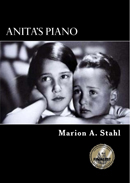
 |
Anita Ron Schorr lived her early years in Czechoslovakia as the daughter of a Jewish family who loved music. Their lives changed when Germany invaded their country and began targeting Jewish people. The family was ordered to vacate their large home near Spielberg Castle in Brno. Anita, a precocious nine year old, called Hitler a yobo (bully) and wrote him an angry letter. When she turned eleven, they were forced to leave their apartment and transported to a ghetto. There Anita and her younger brother stayed with their mother, while the father lived and worked elsewhere in the complex. Their possessions were gone; they were hungry all the time. Anita realized they were living a nightmare.
The next move was to Auschwitz, with tattooed numbers for names and naked examinations. Anita’s salvation came when workers were needed in Germany. At thirteen she lied about her age, as her mother advised, and resentfully left. A group of older girls "adopted" her. At least workers received food. What kept Anita going? She had left a loving family behind, was encouraged by kindnesses from strangers along the way, and retained the buoyant enthusiasm of youth. Anita kept hoping until American soldiers arrived to set them free. And she always hoped to find her family and their piano again.
After seventy years, she finally spoke up. Inspired by Nobel Peace Prize winner, Elie Wiesel, Anita visited schools sharing her story with a new generation. She met Marion A. Stahl; together they told her story to help answer two universal questions. Could I survive? Can love overcome hate? Anita’s Piano tells us we can—because we were made for a purpose that gives us hope. Since the narrative is mostly written from the perspective of an 9-12 year old, the author interjects short explanations about events. Anita's Piano was a 2015 Montaigne Medal Finalist.
RECOMMENDED by the US Review